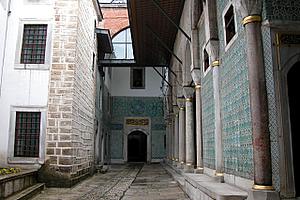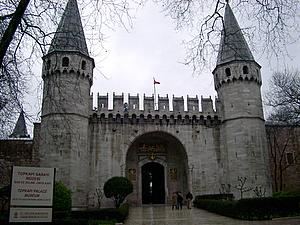When Sultan Mehmet the Conqueror took over Istanbul in 1453, he first ordered the construction of a new palace for this new Ottoman capital, on a site in the district of Beyazit where Istanbul University stands today. Then he changed his mind and had a number of buildings constructed on the headland which was an olive grove to the southeast. It is these buildings that became the Topkapi Palace. The Topkapi Palace was the home to all the Ottoman sultans until the reign of Abdulmecid I (1839-1860), a period of nearly four centuries. The final form of the first palace covered an area 700m², and was enclosed with fortified walls 1400 meters in length. The walls had a number of gates, namely the Otluk gate, the Demir gate and the Imperial Gate and a number of minor angled gates between them. After the reign of Mehmet, the palace grew steadily to form a city like complex of buildings and annexes, including a shore palace known as the Topkapi shore palace, as it was situated near the cannon gate -Topkapi- of the ancient walls of Istanbul. When the shore palace was burned down in 1863, it lent its name to the great complex we now know as Topkapi Palace.
The Topkapi Palace continued to be the principal residence for four centuries until in 1853, Sultan Abdul Mecid I moved into the new palace of Dolmabahce on the Bosphorus. The old palace was used as house for the women of the departed sultans and their servants until the Harem was officially disbanded in 1909. In 1924, Topkapi Palace was converted to a museum on instructions of Mustafa Kemal Ataturk. The final step was the opening of the Harem to the public in 1960.
Because Topkapi is the first attraction to tick off on everyone's list get there when it opens, so get there early. The Topkapi Palace Museum is open between 9:00 am-5:00 pm everyday except for Tuesdays. Tickets can be purchased in the gateway to the Second Court. The tickets cost 12.000.000 TL. (equivalent to about 8 USD or 7 EUR) per person. The treasury section needs a separate admission fee and costs 10.000.000 TL. There is a discounted fee for the students. The Harem Section can be visited with a separate ticket in the ticket office near the Harem entrance. The tours to Harem are operated every half hour from 9:30 am to 4:00 pm. The tickets cost 15.000.000 TL(11 USD or 9 EUR).
Go straight to the Harem, which can only be seen by guided tour, as the tours fill up early. After the Harem tour you can stroll around the palace's grounds and the four courtyards at your leisure. Also, don't miss the Treasury in the 3rd courtyard which houses gold, and works of art.
Straight after the Topkapi Palace, head for the Aya Sofia and the Blue Mosque which are virtually next door.

Courtyard of the Eunuchs

A room in the harem

Topkapi Imperial Hall, Harem

Topkapi Gate
